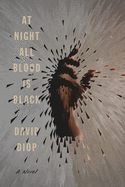
Spare and devastating, At Night All Blood Is Black by French Senegalese author David Diop is a bone-chilling anti-war treatise. He chooses as backdrop a little-known chapter of World War I annals, when the French government drafted some 200,000 soldiers from its colonies, including Senegal. The unfolding tragedy, involving two 20-year-old "more-than-brothers" conscripted to kill strangers for incomprehensible reasons, resonates far beyond the geographic, political, racial and historical details.
Mademba Diop lies disemboweled on the battlefield. He knows survival is impossible, and begs Alfa Ndiaye, his best friend, to end his suffering. Unable to extinguish Mademba's life, Alfa bears witness to his excruciating death. Alfa's guilt-ridden retaliation turns brutal, as he regularly sneaks into enemy ranks and slaughters German soldiers--returning to the trenches each time with a German's severed hand. Whether foe or friend, Alfa quickly realizes, "At night, all blood is black."
Somehow, he stays safe: "Temporary madness makes it possible to forget the truth about bullets." His fellow soldiers are initially "very, very pleased" at his reckless audacity, but their reactions turn to fear by the appearance of the fourth hand. After the eighth mutilation, the captain sends Alfa to "the Rear" for a month-long "rest" where he reveals to the ironically monikered Doctor François an abusive childhood, his bond with Mademba, his first love--and, most desperately, his fraying connection to reality.
Making his English-language debut with his second title, Diop has an ideal translator in Anna Moschovakis, who renders his prose into a gorgeously disturbing devolution of humanity. Overlapping bildungsroman, fever dream, morality tale and historical record, Diop creates an outstandingly affecting, genre-defying nightmare. --Terry Hong, Smithsonian BookDragon

